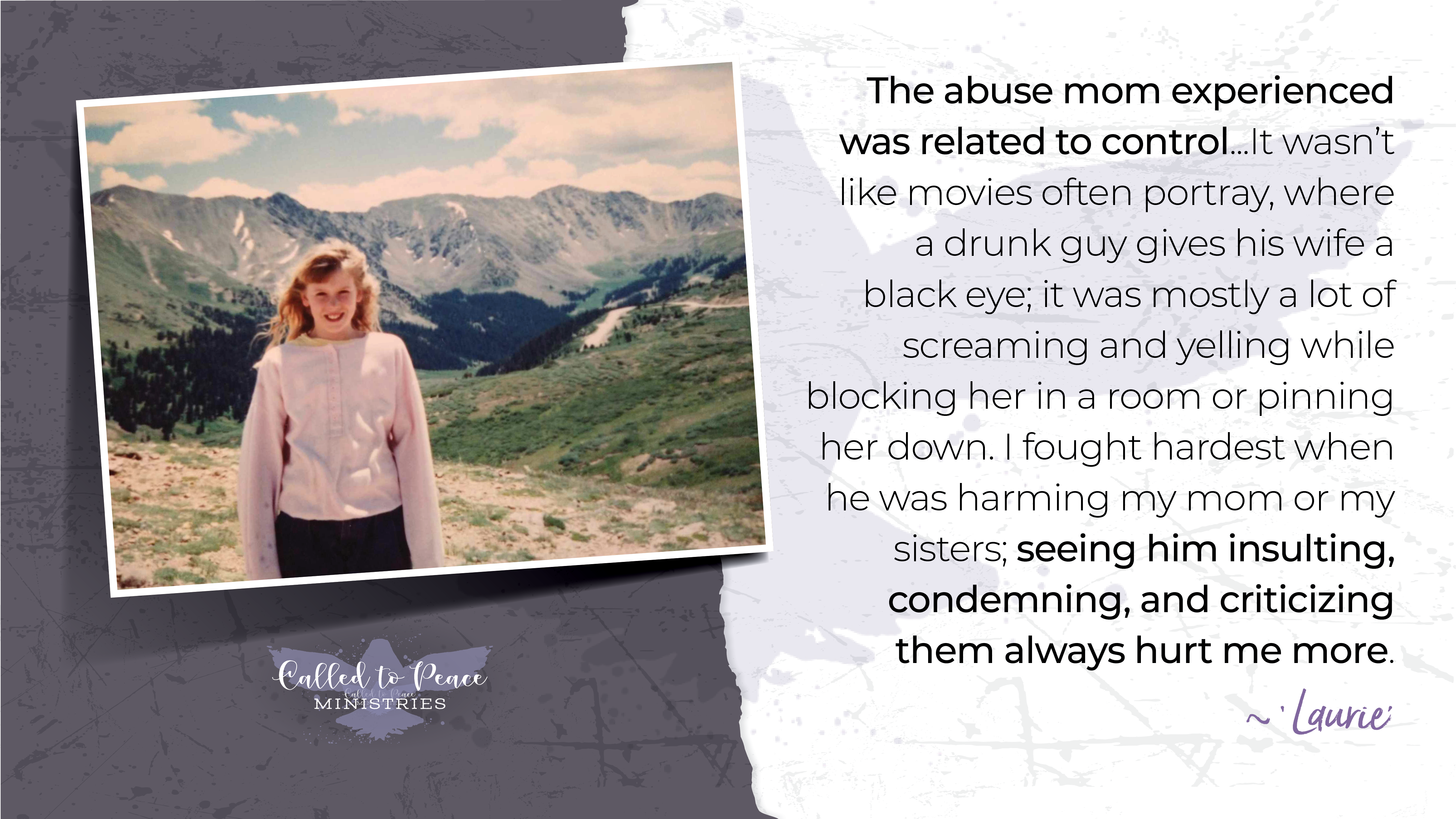Written by Lauren, as told by Laurie
By the time I was born, my mom had already been married to, and lived with, my abusive dad for over three years. The abuse she experienced was related to control: he was never satisfied with her, and wanted to recreate her in an image that he found more desirable. It wasn’t like movies often portray, where a drunk guy gives his wife a black eye; it was mostly a lot of screaming and yelling while blocking her in a room or pinning her down. (Though to be sure, there were times where we did get bruises.)
My earliest memory of witnessing abuse was when I was five or six years old; my dad was pinning my mom down, yelling in her face that she needed to change something about her body. I was scared and distraught, as I could see that my mom was frightened and hurting. Eventually, the conflict ended; during the struggle, I had tried to pull him off her, and he wanted to spank me for interfering. She didn’t let him. Over the years, he commonly accused her of interfering with his parenting and leadership — when what she was doing was protecting us from the more extreme forms of his abuse.
My dad faithfully read his Bible daily and prayed out loud. He sat in the pews next to us, saying “Amen” throughout the sermon, smiling in the lobby, talking with people, volunteering to help others move, etc. My dad repeated phrases like, “You know what the most important thing is, Laurie. . . Live for Jesus!” I didn’t realize it then, but my feelings of being repelled by him, the churning in my stomach, and the scream stuck in the back of my throat – none of that was about rejecting God; not the real, true God.
I went on to grow in strength, learning to resist his abuse. I fought hardest when he was harming my mom or my sisters; seeing him insulting, condemning, and criticizing them always hurt me more. My dad was verbally, emotionally, spiritually, and sometimes physically abusive. He often yelled about how my mom, two sisters, and I needed to submit to him — yet, he didn’t seem concerned about his harshness, nor that his children were becoming embittered and frustrated under his treatment.
I had wondered: if we just carried out our “roles” perfectly enough…if we prayed enough…maybe my dad would stop (or at least not get so angry).
“How is it that a man can sit in church for fifty years and believe that he can treat his family as my dad does?” I asked a couple of pastors familiar with our family. One pastor “sin leveled,” declaring that though he had never seen my dad be loving, he had also never seen my mom be respectful. The issue of coercive control wasn’t even on their radar; rather, the pastor expressed that he didn’t like the “pushback” from my mom.
While in college, I even bought my mom a copy of the book “The Power of a Praying Wife,” as the author specifically references abuse as something that can change. I regret my own ignorance, no matter how well-meaning I was.
It continues to grieve me, having someone falsely place blame for the situation on my mama — when it was clear to me that the constant and overwhelming grind of my dad’s criticism, condemnation, and coercive control was the epicenter of the problem.
It has taken a lot of counseling to help me heal, and truly move past the poor responses I received from some pastors; to accept that they did the best they could, within the confines of their limited framework and their own ignorance of abuse. I have shared all I can with them, and must now trust them and their ministry to the Lord.
I continued visiting with pastors and pastoral administrators, hoping to convince them of the need to talk about the domestic abuse already happening in their pews. Through these efforts, I was introduced to Dan Boeck, Church Liaison Coordinator, and thus Called to Peace Ministries (CTPM).
CTPM provided further healing, training me as an advocate for the oppressed. It brought an understanding of the childhood abuse I had experienced – specifically the spiritual abuse – which I couldn’t name until recent years. The training at CTPM helped clarify my message to churches, as I myself have become a CTPM Church Partnership Liaison. I’m thankful for the light and freedom CTPM brings to those silently suffering in our congregations.
Our God is gracious; He has called me to my own ministry, as he creates meaning from both the primary wounding (my father’s abuse) and the secondary wounding (the church’s response).
As I visit with pastors, I desire to stir in their hearts a willingness to learn, and raise their awareness regarding the presence of abuse in their congregations. All I can do is pray, and invite them…then trust the Lord with the outcomes.
It’s surreal to be able to visit with pastors as my adult survivor-self, now giving voice to the child victim that I was; I couldn’t help myself as a child in the way that I can today.
And now, in turn, there are young victims in our pews who don’t know their own voice, and don’t have vocabulary to use to describe the confusion they are experiencing. I think it was Beth Moore who said, “It wasn’t worth it, but it means something.”
